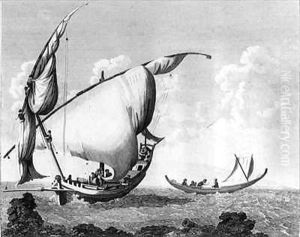Elizabeth (Lady Craven) Berkeley Paintings
Elizabeth Berkeley, better known as Lady Craven and later Margravine of Brandenburg-Ansbach, was a British author, playwright, travel writer, and socialite of the 18th century. Born on December 17, 1750, in Berkeley Square, London, she was the daughter of Augustus Berkeley, 4th Earl of Berkeley, and Elizabeth Drax. She grew up in a privileged environment and received an education that was unusual for women of her time, which included learning French, Italian, and music.
In 1767, Elizabeth married William Craven, the 6th Baron Craven, and became Lady Craven. They had seven children together. However, their marriage was not a happy one, and they separated in 1780. During her marriage, she began to write plays and other literary works, some of which were performed in private theatres. She was known for her wit and intelligence, and her literary talents brought her some notoriety.
After her separation from her husband, Lady Craven traveled extensively throughout Europe, a journey she chronicled in her travel writings. Her travels took her to France, Russia, Turkey, and the Crimea, among other destinations. Lady Craven was received in various European courts and became acquainted with a number of influential figures, including kings, queens, and intellectuals.
In 1791, after the death of her estranged husband, she married Christian Friedrich Carl Alexander, the Margrave of Brandenburg-Ansbach and Bayreuth. Upon her second marriage, she became the Margravine of Brandenburg-Ansbach and moved to Germany. Her life as a Margravine was marked by her efforts to improve the cultural and social institutions of Ansbach, as well as by her continued literary work.
Lady Craven published a number of books, including her memoirs and travel accounts, which provide valuable insights into the life of an aristocratic woman of the late 18th century and the cultural and political landscapes of the countries she visited. Her writing style was engaging and often lighthearted, which made her work popular among contemporary readers.
Elizabeth, Margravine of Brandenburg-Ansbach, died on January 13, 1828, in Naples, Italy. She left behind a legacy as a woman who crossed conventional boundaries of her time through her travels, her writing, and her intellectual pursuits.
